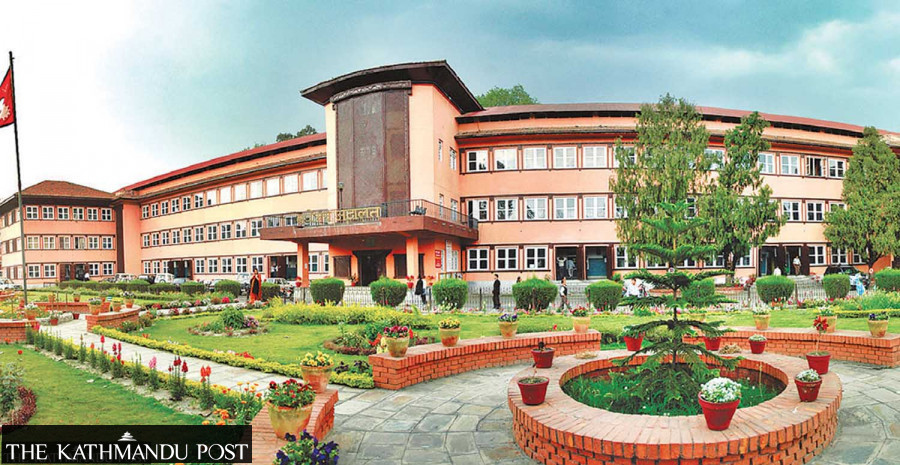National
Top court finally starts hearing petitions against four-year-old constitutional body appointments
The 52 appointments made by KP Sharma Oli in his earlier prime ministerial term were controversial for the recommendation process was modified through an ordinance.
Post Report
The Supreme Court has finally started hearing the writ petitions challenging the appointment of more than four dozen chairpersons and members of various constitutional commissions.
The five-member constitutional bench of the top court began hearing the 15 petitions lodged four years back. “I and senior advocate Chandra Kant Gyawali presented arguments against the appointment from the plaintiff’s side,” said advocate Om Prakash Aryal, one of the petitioners. “We have been told that continuous hearing will start next month.”
The bench, led by Chief Justice Prakash Man Singh Raut, has justices Sapana Pradhan Malla, Manoj Kumar Sharma, Kumar Chudal and Nahakul Subedi. Justices Kumar Regmi and Hari Phuyal, whose benches in the past had passed some orders in the petitions, have recused themselves from the bench.
The next hearing is slated for March 5.
The Constitutional Council recommended 52 individuals for appointment to various constitutional bodies on December 15, 2020, and May 9, 2021, when CPN-UML chair KP Sharma Oli was the prime minister. Then, President Bidya Devi Bhandari appointed the chair and four commissioners based on the recommendations without parliamentary hearing. The House of Representatives was then dissolved by the Oli-led government, only to be reinstated by the Supreme Court later.
After a controversial amendment to the Constitutional Council (Functions, Duties, and Procedures) Act, the council had recommended them through an ordinance on December 15, 2020.
The recommendations were made by three—the prime minister, the National Assembly chairperson and the chief justice—of the six council members. Although there is a constitutional provision for mandatory parliamentary hearings, Bhandari appointed the commissioners based on the House regulation that a nominee is considered eligible for the nominated position if the parliamentary hearing committee fails to take a decision within 45 days.
Among the 15 petitions some have challenged the amendment to the Act through an ordinance by the Oli government and while others have demanded termination of the appointments or both. Not just the advocates but then-Speaker Agni Sapkota too moved the top court against the recommendations and subsequent appointments.
After preliminary hearing, the court sent all the petitions to the constitutional bench. The court had issued a show-cause against the defendants and they have already furnished their clarifications.
Article 137 of the constitution envisions a five-member constitutional bench led by the chief justice to mainly settle disputes related to jurisdictions between the centre and the provinces, between provinces, between a province and local units, and between local units. The bench is also entrusted with giving verdicts in cases concerning the interpretation of the constitution. The bench also decides most of the writ petitions that are complex in nature.
“The final hearing has started after an unnatural hiatus of years,” said senior advocate Dinesh Tripathi, another petitioner. “Now we can hope that the verdict will be passed in a couple of months.”
The chairperson and members of the constitutional commissions have six years of service. While there is no retirement age for the office bearers at the National Human Rights Commission, the chiefs and members of other constitutional commissions retire at 65. Some of the office bearers have already retired.
Ram Krishna Timilsina, chairperson of the Inclusive Commission, for instance, has retired after attaining the age 65. Others too have completed four years of their six-year tenure.
Even lawmakers had started questioning the frequent deferrals in hearing the petitions. Last month, cross-party lawmakers, in the meeting of the Law, Justice and Human Rights Committee of the lower house, had said not concluding the hearing even four years after the appointments was concerning. The office bearers of the National Human Rights Commission had also been demanding timely hearing.




 10.12°C Kathmandu
10.12°C Kathmandu














